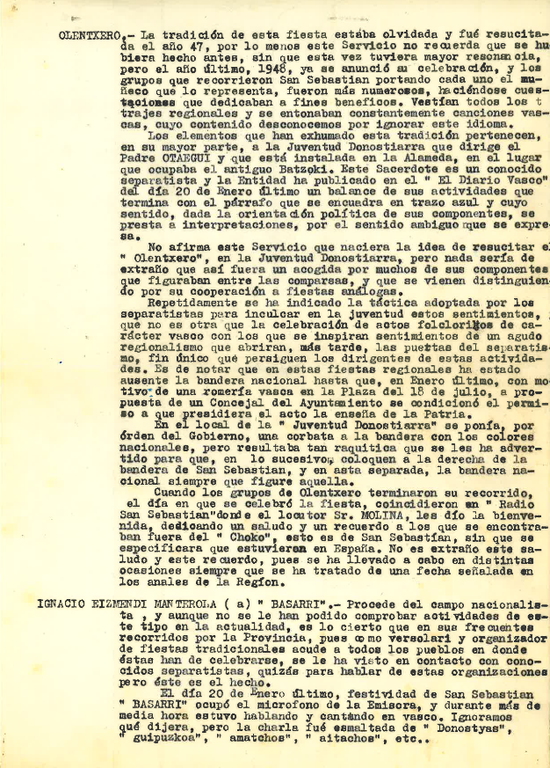
- In the late 1940s, Olentzero was the destination of the police. For the kidnapping and murder of children? No! It could be that the Olentzero would put the children in the bag and pass them to the sea, or that it would come with the sickle that the children would be told to cut their neck. But no, the police were persecuted among the youth for "opening separatist feelings".

The Provincial Historical Archive of Gipuzkoa published in 1949 the report of the Police Commissioner of San Sebastian on the Olentzero. The police say that the tradition of this party was lost and that it was recovered in 1947. In 1948 there were a large number of Olentzero's requests:
"San Sebastián San Sebastián atatzen duten talde batek, eta muina, besterik gabe, helburu benéfico egiten ditugu. Euskaratu eta euskal kantuzas see daude, eta ez dakiguren content ez dakiguren bat".
Police had jobs to understand the songs of the Olentzero. Finally, the civil government authorized the festival, but they had to go to censorship, that is, the organizing committee of the Olentzero sent a request for authorization to the civil government, in which they had to collect the letters of songs they would sing in pasacalles, along with the translation in Spanish.
For example:
"Olentzero" big head
recognition
baby
a skin of ten sheep
Father Otaegi, who organized and encouraged Olentzero's pasacalles in Donostia, was apparently "fichado": "This priest is a separatist." The police state that the only goal to resurrect "Olentxero" is to extend nationalism and separatism among young people:
"Behin eta berriro esan da separatistas por tactica, eta ez dela beste sentierten, eta ez dela beste ekintza-folcloritoak euskal izoan bere sentimaz regionalism bat iran, gero, separatismoan atea. Hori bakarrik, ekintza-esku daude".

Short chain basarri
While the first and most of the report focuses on the section on "Olentxero", the following sections also have content. The report shows that Bertsolari, journalist and writer Inazio Eizmendi Basarri followed the police very closely, with her original sin ("Not from the nationalist camp") and her movements and relationships as dangerous ("she has been seen in contact with known separatists"). But the ignorance of the Basque country blinded the Francoists: "Euskeraz ari gara hitz eta kantatuz. We don't know what he said, but the talk was glazed by "Donostyas," "guipuzkoa," "amatchos," "aitachos," etc.
Enemies of Spain
There are convents and churches in which the priests regularly give Mass in Basque to the police and these priests are considered enemies of Spain:
"PRIESTS WHO DO HOW MUCH HARM THEY CAN TO SPAIN.- Basque priests separatistak legioa dira nor baino minimo beroa Mobiletik postulates, eta procura, bere eragin undoubted, Patria kontra sentimendua bizirik eutsi".
Report of the Police Commissioner: Olentxero (pdf)
Translations of villancicos:
Source: Arrival of the dangerous "Olentxero" 1947.urtean (Historical Provincial Archive of Gipuzkoa, 21-12-2023)